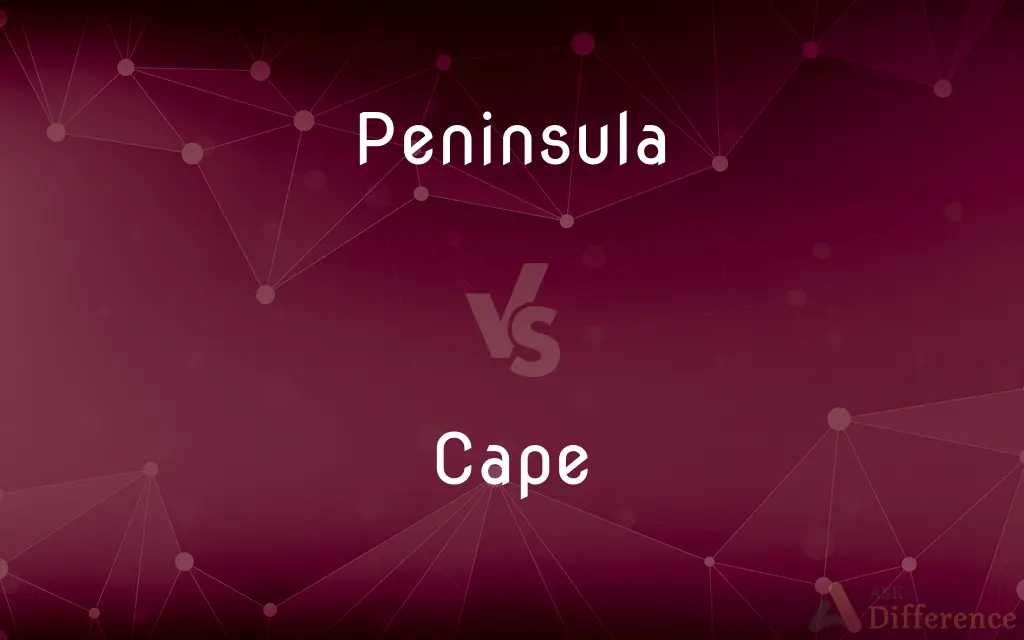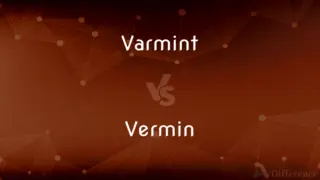Peninsula vs. Cape — What's the Difference?
By Maham Liaqat & Fiza Rafique — Updated on March 20, 2024
A peninsula is a landform surrounded by water on three sides, offering broad access to the sea, whereas a cape is a pointed piece of land that extends into a water body, marking a significant change in coastline direction.

Difference Between Peninsula and Cape
Table of Contents
ADVERTISEMENT
Key Differences
A peninsula is characterized by its significant size and the fact that it is surrounded by water on three sides, forming a natural extension of the land into a water body. This geographical feature often serves as a distinctive landmass offering unique ecosystems and habitats. On the other hand, a cape is generally smaller and is notable for its pronounced point jutting into the sea or ocean, acting as a navigational landmark for sailors and affecting local climates and coastal currents.
Peninsulas play a crucial role in geopolitics and economics, as their strategic location can control maritime routes and facilitate trade and defense. For example, the Arabian Peninsula is pivotal for global oil logistics. Whereas capes, due to their protruding nature, often host lighthouses or signal stations to aid maritime navigation, like the Cape of Good Hope which is renowned for treacherous waters and historical maritime significance.
The formation of a peninsula can be attributed to various geological processes such as tectonic movements and erosion, which shape the land over millennia. Peninsulas can be large, spanning thousands of square miles. In contrast, capes are formed by differential erosion where softer rocks erode faster than harder ones, creating a pronounced point, and they are usually smaller than peninsulas.
From a tourism perspective, peninsulas often attract visitors with their vast and varied landscapes, offering beaches, cliffs, and cultural sites. The Italian Peninsula, for example, is known for its rich history and Mediterranean climate. Capes, while they may also be tourist destinations, are sought after for their panoramic views, dramatic landscapes, and the symbolic "end of the land" experience, such as Cape Cod, which is celebrated for its picturesque beaches and maritime character.
In terms of biodiversity, peninsulas can have a wide range of ecosystems, from coastal to inland habitats, supporting diverse flora and fauna. This diversity is due to the larger area and varied terrain. Capes, being smaller and more exposed to marine influences, might have specialized ecosystems adapted to harsher, windier, and saltier conditions, which can be fascinating for ecological studies.
ADVERTISEMENT
Comparison Chart
Size
Generally large, extending into a water body
Smaller, pointed land extending into water
Surroundings
Surrounded by water on three sides
Not necessarily surrounded by water on three sides
Geological Formation
Result of tectonic movements, sediment deposits
Formed by differential erosion of rock
Function
Often strategic for trade, defense; diverse ecosystems
Navigational landmarks, affects coastal currents
Tourism
Offers varied landscapes, cultural sites
Known for dramatic views, "end of the land" experience
Compare with Definitions
Peninsula
An area of land projecting into a body of water.
The Iberian Peninsula is home to Spain and Portugal.
Cape
A navigational landmark for maritime travel.
Ships rounding Cape of Good Hope must navigate carefully due to treacherous seas.
Peninsula
A landform surrounded by water on three sides.
The Florida Peninsula is a popular tourist destination known for its warm climate and beautiful beaches.
Cape
A point of land that extends into a water body.
Cape Horn is known for its challenging sailing conditions.
Peninsula
A geographical feature that influences climate and biodiversity.
The Scandinavian Peninsula experiences a colder climate due to its northern latitude.
Cape
An area often characterized by unique ecosystems.
Cape Verde has distinctive flora and fauna adapted to its arid climate.
Peninsula
A landform that can be large and contain multiple countries.
The Arabian Peninsula is the world's largest peninsula.
Cape
A site frequently equipped with lighthouses or signal stations.
The lighthouse on Cape Canaveral is an important aid to navigation for ships.
Peninsula
A significant, extended part of the mainland into the sea.
The Korean Peninsula has a strategic geopolitical location in East Asia.
Cape
A landform marked by a significant change in coastline direction.
Cape Cod curves out into the Atlantic Ocean, forming a natural bay.
Peninsula
A peninsula (Latin: paeninsula from paene 'almost' and insula 'island') is a landform surrounded by water on most of its border while being connected to a mainland from which it extends. The surrounding water is usually understood to be continuous, though not necessarily named as a single body of water.
Cape
A cape is a sleeveless outer garment which drapes the wearer's back, arms, and chest, and connects at the neck.
Peninsula
A piece of land almost surrounded by water or projecting out into a body of water.
Cape
A sleeveless cloak, typically a short one
He was wearing a flowing cape
Peninsula
A piece of land that juts out from a larger land mass and is mostly surrounded by water.
Cape
The pelt from the head and neck of an animal, for preparation as a hunting trophy
The hair on a cape for the taxidermist can spoil in warm weather
Peninsula
(geography) A piece of land projecting into water from a larger land mass.
Cape
A headland or promontory
We could see the island from the cape
Peninsula
A portion of land nearly surrounded by water, and connected with a larger body by a neck, or isthmus.
Cape
(in bullfighting) taunt (the bull) by flourishing a cape
The film shows a man expertly caping a charging bull
Peninsula
A large mass of land projecting into a body of water
Cape
Skin the head and neck of (an animal) to prepare a hunting trophy.
Cape
A sleeveless outer garment fastened at the throat and worn hanging over the shoulders.
Cape
A brightly colored cloth used in maneuvering the bull in a bullfight; a capote or muleta.
Cape
A point or head of land projecting into a body of water.
Cape
To maneuver (the bull) by means of a cape in a bullfight.
Cape
(geography) A piece or point of land, extending beyond the adjacent coast into a sea or lake; a promontory; a headland.
Cape
A sleeveless garment or part of a garment, hanging from the neck over the back, arms, and shoulders.
Cape
(slang) A superhero.
Cape
To incite or attract (a bull) to charge a certain direction, by waving a cape.
Cape
(nautical) To head or point; to keep a course.
The ship capes southwest by south.
Cape
To skin an animal, particularly a deer.
Cape
To defend or praise, especially that which is unworthy.
Cape
(obsolete) To look for, search after.
Cape
To gaze or stare.
The captain just caped mindlessly into the distance as his ship was hit by volley after volley.
Cape
A piece or point of land, extending beyond the adjacent coast into the sea or a lake; a promontory; a headland.
Cape
A sleeveless garment or part of a garment, hanging from the neck over the back, arms, and shoulders, but not reaching below the hips. See Cloak.
Cape
To head or point; to keep a course; as, the ship capes southwest by south.
Cape
To gape.
Cape
A strip of land projecting into a body of water
Cape
A sleeveless garment like a cloak but shorter
Common Curiosities
What is the main difference between a peninsula and a cape?
The main difference lies in their size and formation; peninsulas are large landmasses surrounded by water on three sides, while capes are smaller, pointed lands extending into water.
Can a peninsula have multiple capes?
Yes, a peninsula can have multiple capes along its coastline.
What factors contribute to the formation of peninsulas and capes?
Geological processes such as tectonic movements, sediment deposits, and differential erosion contribute to their formation.
Why are capes important for navigation?
Capes serve as navigational landmarks, helping sailors to identify their location and navigate through treacherous waters.
Do both peninsulas and capes affect biodiversity?
Yes, both can influence local ecosystems and biodiversity, though in different ways due to their size and geographical features.
Can human activities impact the shape of peninsulas and capes?
Yes, activities like coastal development and erosion control can alter their shapes over time.
Do capes have beaches?
Many capes have beaches, often characterized by unique coastal features due to their exposed location.
What is a famous example of a peninsula?
The Arabian Peninsula is a famous example, known for its oil reserves.
Are peninsulas always larger than capes?
Generally, yes, peninsulas are larger and more extensive than capes.
Is it possible for a cape to become an island?
Through processes like erosion and sea level rise, parts of a cape may become separated from the mainland, forming an island.
How do peninsulas affect the climate of an area?
Peninsulas can influence local climates by extending into water bodies, affecting wind patterns and temperatures.
Are there any peninsulas that are also islands?
Not typically, as peninsulas are defined by being connected to a larger landmass, while islands are completely surrounded by water.
What is a well-known cape?
The Cape of Good Hope is well-known for its historical significance in maritime exploration.
Why are some capes famous for their lighthouses?
Lighthouses on capes serve as critical navigation aids due to the dangerous waters and busy shipping lanes near many capes.
How do peninsulas contribute to a country's economy?
Peninsulas can contribute through strategic trade routes, tourism, and natural resources.
Share Your Discovery

Previous Comparison
Varmint vs. Vermin
Next Comparison
Dinner vs. DinerAuthor Spotlight
Written by
Maham LiaqatCo-written by
Fiza RafiqueFiza Rafique is a skilled content writer at AskDifference.com, where she meticulously refines and enhances written pieces. Drawing from her vast editorial expertise, Fiza ensures clarity, accuracy, and precision in every article. Passionate about language, she continually seeks to elevate the quality of content for readers worldwide.













































